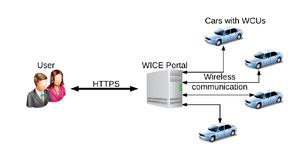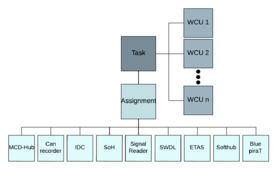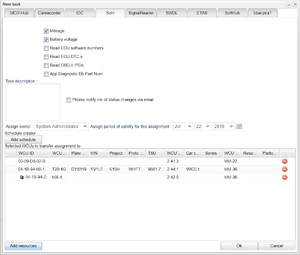Difference between revisions of "Quick Start"
Alkitjohan (talk | contribs) m (Removed protection from "Quick Start") |
|||
| (27 intermediate revisions by 4 users not shown) | |||
| Line 1: | Line 1: | ||
This chapter takes you on a tour to quickly get acquainted with the WICE Portal to see how it works. | This chapter takes you on a tour to quickly get acquainted with the WICE Portal to see how it works. | ||
As the WICE Portal is a web based tool there is no need to install any software on your computer. All you need is a web browser, such as Internet Explorer, which has Javascript enabled. Using the WICE Portal you can for example | As the WICE Portal is a web based tool there is no need to install any software on your computer. All you need is a web browser, such as Internet Explorer, which has Javascript enabled. Using the WICE Portal you can for example see which measurement assignments are running, check each assignment's respective status, get result files from measurement tasks, and much more. | ||
In this quick start you will first be introduced to the basic model, and how it is supposed to work. Once the basics | In this quick start you will first be introduced to the basic model, and how it is supposed to work. Once the basics have been covered a simple scenario will be presented. This scenario will show how a task you have created is sent to a vehicle and then started. How to access the data generated by a task will also be covered. | ||
__TOC__ | __TOC__ | ||
==Basic Conceptual Model== | ==Basic Conceptual Model== | ||
[[File:Illustration1.png|alt=|thumb|Figure 1: This image shows how you the user, the WICE portal and the | [[File:Illustration1.png|alt=|thumb|Figure 1: This image shows how you the user, the WICE portal and the vehicles in the field are connected. As you see here you as the user access the WCUs and their vehicles through the portal.]][[File:Illustration2.png|thumb|Figure 2: This figure shows how a task, assignment and WCU correlates. As you see the task is connected with an unspecified amount of WCUs where the task will execute. The task is also connected to one of the nine assignment as its that assignment that the task will be running.|277x277px]]The basic functionality of the WICE portal is to manage so called ''tasks''. A task is an assignment to perform a specific action, typically collect measurement data from one or more vehicles. Tasks are created in the WICE portal and connected to a number of Wireless Communication Units (WCUs), which are in-vehicle units connected to the vehicles' internal communication buses. After a task has been created, the assignment is downloaded by each of the defined vehicles when ignition is turned on. Each WCU then runs the task's assignment, typically producing output in the shape of measurement data files, which are uploaded to the WICE portal. The user can then see the task's result on each WCU as the task's assignment will get different results depending on which WCU it ran on. To recap and illustrate how this works you can look at figure 1 and 2 explaining how this correlates. | ||
[[File:Illustration2.png|thumb|Figure 2: This figure shows how a task, assignment and WCU correlates. As you see the task is connected with an unspecified amount of WCUs where the task will execute. The task is also connected to one of the nine assignment as its that assignment that the task will be running.|277x277px]]The basic | [[File:A Simple Scenario.png|thumb|Figure 3: This is how a task can look when it is ready to be created.]] | ||
[[File:A Simple Scenario.png|thumb|Figure 3: This is how a task can look when it is ready to be | |||
==A Simple Scenario== | ==A Simple Scenario== | ||
Now that we have gone through the concept of the WICE portal we will | Now that we have gone through the concept of the WICE portal we will give a more concrete example. Let's say you want to create a task with a State of Health (SoH) assignment where you collect the mileage and battery voltage of a connected vehicle. To do this you need to [[The Portal User View#Login|log in]] to the WICE portal with your WICE login (username and password). | ||
Now that you are logged in you create a new task by clicking the "New Task" button at the bottom of the screen. When pressing the button a dialog will be shown with one tab for each assignment. To make the task a SoH task you click the SoH tab where the options for creating one will be shown. There you will at the top see six different checkboxes with different | Now that you are logged in you create a new task by clicking the "New Task" button at the bottom of the screen. When pressing the button a dialog will be shown with one tab for each type of assignment. To make the task a SoH task you click the SoH tab where the options for creating one will be shown. There you will at the top see six different checkboxes with different data items that SoH can collect. Check the boxes for voltage and mileage and scroll down to click "Add resources". A window will appear where we can search and add WCUs. You can search for a WCU by different criterea and when you have found the WCU(s) you wanted and have dragged them to the bottom box with the selected WCUs you press "Done". Now it should look like it does in figure 3 and you can now press "OK" to start the task. We don't need to fill the other boxes as we don't need a description, notification about status via email or schedule. That was a quick instruction on how to create a new task but you can read more detailed about how to create every sort of task at [[The Portal User View#Creating a Task|Creating a Task]]. | ||
When the task is done it will have generated results. You can | When the task is done it will have generated results. You can find them by searching for the WCU(s) you used in the Tasks tab (on the home screen). When you have found the WCU and your assignment you can select it and press the "Get Result Files" in the bottom left corner. This will open a panel where you can search among the result files. When you have selected a file you gain access to multiple options. You can download the files (get files), plot the GPS data of the vehicle (plot route), preview the data files, or study the log files. There is more information about the Tasks tab and viewing results in [[The Portal User View#Tasks Tab|Tasks Tab]]. | ||
Latest revision as of 14:31, 17 May 2022
This chapter takes you on a tour to quickly get acquainted with the WICE Portal to see how it works.
As the WICE Portal is a web based tool there is no need to install any software on your computer. All you need is a web browser, such as Internet Explorer, which has Javascript enabled. Using the WICE Portal you can for example see which measurement assignments are running, check each assignment's respective status, get result files from measurement tasks, and much more.
In this quick start you will first be introduced to the basic model, and how it is supposed to work. Once the basics have been covered a simple scenario will be presented. This scenario will show how a task you have created is sent to a vehicle and then started. How to access the data generated by a task will also be covered.
Basic Conceptual Model
The basic functionality of the WICE portal is to manage so called tasks. A task is an assignment to perform a specific action, typically collect measurement data from one or more vehicles. Tasks are created in the WICE portal and connected to a number of Wireless Communication Units (WCUs), which are in-vehicle units connected to the vehicles' internal communication buses. After a task has been created, the assignment is downloaded by each of the defined vehicles when ignition is turned on. Each WCU then runs the task's assignment, typically producing output in the shape of measurement data files, which are uploaded to the WICE portal. The user can then see the task's result on each WCU as the task's assignment will get different results depending on which WCU it ran on. To recap and illustrate how this works you can look at figure 1 and 2 explaining how this correlates.
A Simple Scenario
Now that we have gone through the concept of the WICE portal we will give a more concrete example. Let's say you want to create a task with a State of Health (SoH) assignment where you collect the mileage and battery voltage of a connected vehicle. To do this you need to log in to the WICE portal with your WICE login (username and password).
Now that you are logged in you create a new task by clicking the "New Task" button at the bottom of the screen. When pressing the button a dialog will be shown with one tab for each type of assignment. To make the task a SoH task you click the SoH tab where the options for creating one will be shown. There you will at the top see six different checkboxes with different data items that SoH can collect. Check the boxes for voltage and mileage and scroll down to click "Add resources". A window will appear where we can search and add WCUs. You can search for a WCU by different criterea and when you have found the WCU(s) you wanted and have dragged them to the bottom box with the selected WCUs you press "Done". Now it should look like it does in figure 3 and you can now press "OK" to start the task. We don't need to fill the other boxes as we don't need a description, notification about status via email or schedule. That was a quick instruction on how to create a new task but you can read more detailed about how to create every sort of task at Creating a Task.
When the task is done it will have generated results. You can find them by searching for the WCU(s) you used in the Tasks tab (on the home screen). When you have found the WCU and your assignment you can select it and press the "Get Result Files" in the bottom left corner. This will open a panel where you can search among the result files. When you have selected a file you gain access to multiple options. You can download the files (get files), plot the GPS data of the vehicle (plot route), preview the data files, or study the log files. There is more information about the Tasks tab and viewing results in Tasks Tab.


